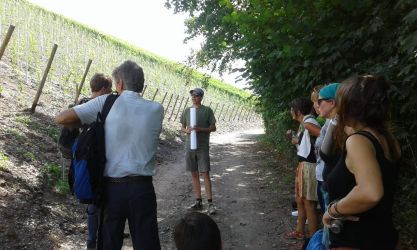Researchers from the University of Trier presented the crop diversification options for German vineyards
By means of a guided walk through the vineyards located in the city of Trier (Germany) and at the hands of the researchers Felix Dittrich and Thomas Iserloh from the University of Trier, the people participating in the activities of the Local Agenda 21 in the city could know the background to ecological production and how crop diversification can improve the productivity of the wines from the Mosel wine-producing area.
 Strolling through the vineyard land that surround the Mosel River on the 20th August it became clear how the inclusion of other crops among the vines, as proposed by Diverfarming, could bring about the end of some of its problems. Mitigating greenhouse gas emissions and recovering the fertility of soils that suffer from erosion and the loss of organic matter is the main objective that the team at the University of Trier pursue, working within this project that is financed by the European Commission’s Horizon 2020 programme.
Strolling through the vineyard land that surround the Mosel River on the 20th August it became clear how the inclusion of other crops among the vines, as proposed by Diverfarming, could bring about the end of some of its problems. Mitigating greenhouse gas emissions and recovering the fertility of soils that suffer from erosion and the loss of organic matter is the main objective that the team at the University of Trier pursue, working within this project that is financed by the European Commission’s Horizon 2020 programme.
In a first phase and in collaboration with Dr. Frey, the organic production wine-making company, a diversification has been introduced that implies the inclusion of aromatic plants such as oregano and thyme under the vines and the pledge of no tilling and having vegetation cover in the alleys. The intention of this is to stabilise the soil and thus recover its fertility and achieve greater productivity from the land.
The University of Trier leads this assessment of the link between crop diversification systems with the biodiversity both above as well as in the soil, and how the soil microorganisms influence the soil structure and the crop growth.
At a social level, the project seeks to involve the society in building a more sustainable and fair agriculture which looks after the planet, and thus the synergies arise with the collectives of the Local Agenda 21, which is an action programme designed to develop the sustainability of regions, essential to achieve the objectives of the project.
The pledge behind this association is to promote a more ecological and sustainable society in the Trier region. This is achieved by means of sustainable development initiatives in the long term and the promotion of a focus that is aware of the environment, offering Diverfarming a space in which to work with the interested parties in putting crop diversification and sustainable management techniques into place in one of the largest agroindustries of the zone, that of Mosel wine.
Diverfarming is a project financed by the Horizon 2020 Programme of the European Commission, within the challenge of “Food Security, Sustainable Agriculture and Forestry, Marine, Maritime and Inland Water Research and the Bioeconomy”, which counts on the participation of the Universities of Cartagena and Córdoba (Spain), Tuscia (Italy), Exeter and Portsmouth (United Kingdom), Wageningen (Netherlands), Trier (Germany), Pecs (Hungary) and ETH Zurich (Switzerland), the research centres Consiglio per la ricerca in agricoltura e l'analisi dell'economia agraria (Italy), the Consejo Superior de Investigaciones Científicas (Spain) and the Natural Resources Institute LUKE (Finland), the agrarian organisation ASAJA, and the companies Casalasco and Barilla (Italy), Arento, Disfrimur Logística and Industrias David (Spain), Nieuw Bromo Van Tilburg and Ekoboerdeij de Lingehof (Netherlands), Weingut Dr. Frey (Germany), Nedel-Market KFT and Gere (Hungary) and Paavolan Kotijuustola and Polven Juustola (Finland).










